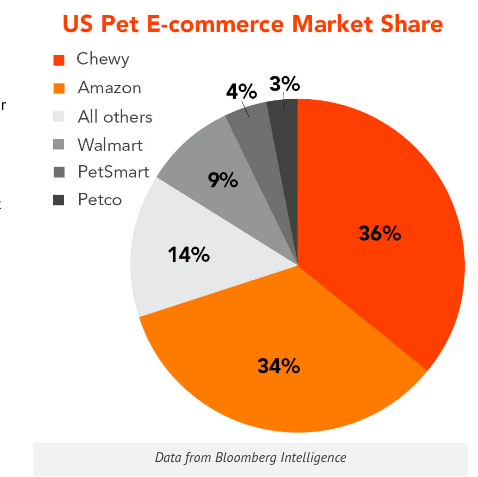Chewy, a leading US-based online pet retailer, has swiftly risen to prominence by leveraging innovative marketing strategies and a customer-centric approach. Founded in 2011, Chewy has transformed the pet retail industry with its seamless online shopping experience, personalized customer service, and extensive product range. In the fiscal year 2023, Chewy achieved an impressive $11.15 billion in net sales, a testament to the effectiveness of its strategic initiatives. By delving into the Chewy marketing strategy, readers will gain insights into the tactics that propelled Chewy to the forefront of the pet retail market, offering actionable takeaways to enhance their business growth.
Stay informed, even during your busiest days — just press play.
Let’s break down the key points ▶
- Customer-Centric Engagement: Chewy builds loyalty with 24/7 support, pet profiles, and heartfelt gestures like handwritten notes and gifts.
- Subscription-Based Loyalty: The Autoship program drives ~70% of sales through scheduled deliveries and member discounts.
- Data & AI Integration: AI enables hyper-personalized marketing, optimized inventory, and targeted messaging that drives ROI.
- Omnichannel & Community Building: Active social engagement and limited physical touchpoints foster brand trust and connection.
- Continuous Innovation & Expansion: From virtual vet care to exclusive product lines, Chewy innovates to stay ahead in pet eCommerce.
Highlights of the Chewy marketing strategy

Chewy’s marketing strategy stands out in the pet retail industry due to its multifaceted approach emphasizing customer satisfaction, personalized engagement, and innovative use of technology. Central to Chewy’s success is its commitment to creating a seamless and enjoyable shopping experience, whether customers are browsing online or interacting with customer service. The company invests heavily in customer support, providing 24/7 assistance and fostering a loyal customer base through personalized interactions and surprise gifts.
The company uses data analytics to tailor product recommendations to individual pets, considering breed, age, size, and dietary needs. This level of personalization ensures every interaction is meaningful and intentional, helping to build a strong emotional connection with customers.
Moreover, the Chewy marketing strategy takes customer engagement one step further by fostering a sense of belonging among pet enthusiasts. Through active social media engagement, interactive campaigns, and community events, Chewy has created a space where pet parents can connect, share stories, and seek advice. The company’s innovative and empathetic approach to customer service, such as sending personalized gifts and handwritten notes, further enhances its reputation and customer loyalty.
Last but not least, Chewy’s Autoship program, which allows customers to set up automatic recurring deliveries, has been instrumental in driving customer loyalty and recurring sales. This program not only offers convenience and savings to customers but also contributes significantly to Chewy’s net sales, with approximately 70% of sales coming from automatic order refills.

Build smarter customer journeys and activate AI-driven personalization for repeat purchases.
Chewy: The business profile of a leading US pet retailer
The historical background of Chewy
Founded in 2011 by Ryan Cohen and Michael Day, Chewy quickly established itself as a dominant player in the pet retail market. Initially operating under the name “Mr. Chewy,” the company faced significant challenges, including fierce competition from established retailers and the need to build trust among pet owners. Despite these hurdles, Chewy’s focus on customer service and strategic innovation allowed it to overcome these obstacles and rapidly grow.
One of the early milestones in Chewy’s journey was the opening of its first fulfillment center in 2013, which helped streamline operations and improve delivery times. By 2015, the company had developed its first private-label brand and reached its first million customers. The launch of the Chewy mobile app in 2016 further enhanced customer convenience and engagement.
In 2017, PetSmart acquired Chewy for $3.35 billion, marking the largest eCommerce company acquisition to date. Despite this, Chewy continued to operate independently. Chewy’s significant achievements continued with the launch of Chewy Pharmacy in 2018 and in 2019, Chewy went public on the New York Stock Exchange under the ticker symbol “CHWY”. By 2021, the company earned a place on the Fortune 500 list., whereas in 2020, Chewy and PetSmart would officially separate and function as independent companies.
Today, Chewy is renowned for its exceptional customer service, extensive product range, and innovative marketing strategies, which have propelled it to become a leading online retailer in the pet industry.

Current market position
Chewy’s market share
The company’s market share has been particularly notable in the online pet retail sector, where it has become a dominant player, outpacing many competitors.

Chewy’s market capitalization
Chewy’s market capitalization has expanded significantly, showcasing strong investor confidence and the company’s substantial value in the e-commerce industry.

Chewy’s revenue evolution
Chewy’s revenue has steadily increased year over year, reflecting the success of its strategic initiatives and market expansion efforts.

The key components of the Chewy marketing strategy
Heartfelt customer engagement: Personalized pet services at its best
Chewy excels in customer engagement by offering personalized pet services that go beyond typical eCommerce interactions. Key aspects include:
- Customized recommendations and pet profile: Chewy uses data analytics to tailor product suggestions based on each pet’s profile.
- 24/7 customer support: Customers can access round-the-clock assistance, ensuring that pet emergencies are addressed promptly.
- Surprise gifts: The company often delights customers with unexpected gestures such as handwritten notes, custom pet portraits, and condolence flowers, fostering a deep emotional connection.
Convenience redefined: The success of the Autoship subscription service

Chewy’s Autoship subscription service is a cornerstone of its business model, driving both customer loyalty and recurring revenue:
- Automatic deliveries: Customers can schedule regular deliveries of pet supplies, ensuring they never run out of essential items.
- Savings and discounts: Subscribers often receive discounts and special offers, adding value and encouraging long-term use.
- High adoption rate: Approximately 70% of Chewy’s net sales come from Autoship orders, reflecting its popularity and effectiveness.
Tech-savvy pet retailing: Leveraging AI and data analytics
Chewy’s innovative use of technology sets it apart in the pet retail industry:
- AI-driven insights: The company leverages AI to analyze customer data, enhancing personalization and optimizing inventory management.
- Data-driven marketing: By understanding customer behavior, Chewy can craft targeted marketing campaigns that resonate with specific segments of its audience.
- Efficient operations: AI helps streamline logistics and supply chain operations, ensuring timely deliveries and reducing costs.
Pharmacy at your doorstep: The impact of Chewy pharmacy
The introduction of Chewy Pharmacy has significantly expanded the company’s services:

- Prescription medications: Customers can order prescription medications for their pets online, simplifying the process and ensuring timely delivery.
- Veterinary services: Chewy’s telehealth service, “Connect With a Vet”, offers virtual consultations, making it easier for pet owners to access professional advice.
- Compounding services: The company provides compounded medications for pets with specific needs, filling a critical niche in the market.
Building a pet lover community: Engaging through social media
The Chewy marketing strategy lies in successfully creating a vibrant community of pet lovers through its social media presence:
- Interactive content: The company shares engaging and informative posts, encouraging pet owners to share their own stories and experiences.
- Community events: Chewy hosts events and campaigns that bring pet owners together, fostering a sense of belonging.
- Active engagement: The company actively responds to customer inquiries and feedback on social platforms, maintaining high levels of interaction and trust.
Retaining loyal customers: Chewy’s exceptional retention strategies
The Chewy marketing strategy employs several effective tricks to retain its loyal customer base:

- Outstanding customer service: Personalized support and quick resolution of issues keep customers satisfied and loyal.
- Loyalty programs: Rewarding repeat customers with special discounts and early access to new products incentivizes continued patronage.
- Emotional connection: By consistently delivering heartfelt and personalized experiences, Chewy strengthens its emotional bond with customers, ensuring long-term loyalty.
Exclusive deals and partnerships: Unique products for pet lovers
Chewy enhances its product offerings through strategic partnerships and exclusive deals:
- Private-label brands: The company has developed several private-label brands that offer unique products not available elsewhere.
- Collaborations: Chewy partners with well-known pet product manufacturers to provide exclusive deals and limited-edition items.
- Customer loyalty programs: Special promotions and discounts for loyal customers further enhance the value proposition.
The Chewy marketing strategy: In-store analysis
To better understand Chewy’s approach to expanding its presence beyond the digital space, let’s analyze the pros and cons of its in-store strategy. This will give retail executives insights into the potential benefits and challenges of implementing similar techniques in their businesses.
| Pros | Cons |
|---|---|
| Enhanced customer engagement through face-to-face support and personalized services | High operational costs in real estate, staffing, and inventory management |
| Increased brand visibility and awareness in local communities | Complex logistics for managing multi-channel inventory and fulfillment |
| Enables seamless omnichannel experiences like in-store pickup | Competition with well-established local brick-and-mortar retailers |
| Fosters community through events, workshops, and local initiatives | Risk of low foot traffic impacting store profitability |
| Strengthens trust and credibility through physical presence | Higher resource allocation may reduce focus on digital operations |
| Provides immediate product access for urgent customer needs | Potential inconsistencies in customer experience across channels |
| Opportunity to educate customers with hands-on product demos | Longer time-to-scale due to physical location setup constraints |
| Drives impulse purchases and higher average order value in-store | Inflexibility in quickly adapting store formats based on market shifts |
The Chewy marketing strategy: eCommerce website analysis
Home page analysis

What we liked:
- User-friendly navigation: Chewy’s homepage features a clean and intuitive navigation bar, allowing users to easily find categories like “Dog,” “Cat,” “Pharmacy,” and “Today’s Deals.”
- Prominent search functionality and sticky header: The search bar is highly visible and offers predictive search suggestions, making it easy for customers to find specific products quickly.
- Engaging visuals and promotions: High-quality images and rotating banners highlight current promotions, deals, and new product launches, effectively drawing customer attention and encouraging purchases.
What we didn’t:
- Limited in-store experience integration: The homepage lacks features that integrate online and offline experiences, such as options for in-store pickup or real-time inventory checks at local stores.
- Overwhelming information density and repetitive elements: At times, the homepage can feel cluttered with too many promotional banners and product suggestions, which may overwhelm users and make navigation less straightforward.
Category page analysis

What we liked:
- Clear and structured layout: The category page is well-organized, with clearly defined subcategories (e.g., Food, Habitats, Accessories) making it easy for users to navigate and find specific products quickly.
- Detailed product listings: Each product listing includes high-quality images, prices, ratings, and brief descriptions, providing shoppers with essential information at a glance, which enhances decision-making.
- Filter and sort options: The page features comprehensive filtering and sorting options, allowing users to narrow down products based on criteria such as brand, price, rating, and special offers. This functionality helps customers quickly find products that meet their needs.
- Customer reviews and Q&A: Each product page links to customer reviews and Q&A sections, providing valuable insights and building trust. This user-generated content can significantly influence purchasing decisions.
- Educational content: The page includes links to care guides and articles related to reptile care, offering added value to customers by providing useful information and establishing Chewy as a knowledgeable and helpful resource.
What we didn’t:
- Limited visual appeal: The category page could benefit from more engaging visuals or thematic banners to make it more visually appealing and captivating for users.
- Absence of interactive elements: There are no interactive elements such as videos or 360-degree product views, which could enhance the shopping experience by allowing customers to explore products more thoroughly.
- Lack of personalized recommendations: Besides the Autoship option, the category page does not prominently feature personalized product recommendations based on user behavior, decreasing cross-selling opportunities.
Product Page Analysis

What we liked:
- Comprehensive product details: The product page includes detailed descriptions, high-quality images, and specifications, providing customers with all the necessary information to make an informed purchase decision.
- Customer reviews and questions: Displaying user reviews and ratings helps build trust and provides social proof, which can significantly influence potential buyers. Moreover, customer questions increase engagement and strengthen brand-consumer relationships.
- Related Products: The page suggests related products, which can help increase average order value through cross-selling opportunities.
- Clear pricing and Autoship discounts: Pricing information is prominently displayed, including any discounts or special offers, making it easy for customers to understand the value they are getting.
- Availability and delivery information: Clear information about product availability and estimated delivery times helps manage customer expectations and enhances the shopping experience.
- Product recommendations with similar items and comparisons: Each product page includes product recommendations and different alternative options based on the current product.
- Cross-selling opportunities: Chewy effectively leverages cross-selling opportunities by displaying frequently bought items on product pages, encouraging customers to add complementary products to their carts, thereby increasing average order value.
What we didn’t:
- Minimal emphasis on customer Q&As and reviews: A more prominent placement of the Q&A and the review section could provide additional insights and help address potential customer concerns more effectively.
- Lack of personalization: The product page does not highlight personalized recommendations based on the customer’s browsing history or previous purchases.
- No sustainability information: Including information about the product’s environmental impact or sustainability practices could appeal to eco-conscious customers.
Checkout page analysis

What we liked:
- Streamlined process: The checkout page is designed for simplicity, reducing the number of steps required to complete a purchase, which helps minimize cart abandonment.
- Multiple payment options: Offering a variety of payment methods, including credit cards, PayPal, and Google Pay caters to different customer preferences.
- Order summary visibility: A clear and concise order summary, including itemized costs and shipping details, allows customers to review their purchases before finalizing the order.
- Multiple login options: Chewy enhances user convenience by offering multiple login and checkout options, including guest checkout, Google/Apple logins, and a variety of payment methods, streamlining the purchase process and reducing cart abandonment rates.
- Upselling opportunities: The checkout page could include subtle upselling opportunities, such as suggesting add-ons or complementary products.
What we didn’t:
- No omnichannel delivery options: The checkout process lacks options for omnichannel delivery, such as in-store pickup or same-day delivery, reducing flexibility and convenience for customers.
- No progress indicators: Including a progress bar could improve transparency and reduce cart abandonment by reassuring customers of their progress.
- Not adequate security assurance: The checkout page does not prominently display security badges or SSL certificates, crucial elements for reassuring customers about the safety of their personal and payment information.
How ContactPigeon’s retail CDP could assist Chewy

- Enhanced personalization: By leveraging detailed customer data, ContactPigeon’s CDP can deliver highly personalized product recommendations and targeted marketing campaigns based on individual customer preferences and behavior, driving higher engagement and conversion rates.
- Improved customer segmentation: Advanced segmentation capabilities allow for precise targeting of different customer groups, such as new pet owners or high-value customers, with tailored offers and communications that increase retention and lifetime value.
- Optimized inventory management: The CDP can analyze purchasing patterns to forecast demand more accurately, ensuring popular items are always in stock and reducing excess inventory, thereby improving operational efficiency and customer satisfaction.
- Seamless omnichannel experience: Integrating online and offline customer data provides a unified view of the customer, enabling seamless experiences across all touchpoints, whether in-store or online, enhancing customer loyalty and sales.
- Data-driven decision-making: Real-time analytics and insights from the CDP empower executives to make informed strategic decisions, optimize marketing spend, improve ROI, and identify new growth opportunities.
Lessons learned from the Chewy marketing strategy
- Prioritize exceptional customer service to build strong loyalty and trust among pet owners.
- Utilize data analytics to personalize recommendations and communications based on pet profiles.
- Implement a subscription-based model like Autoship to ensure recurring revenue and customer convenience.
- Leverage social media to create a community of engaged and loyal customers.
- Offer detailed and comprehensive product information to assist customers in making informed decisions.
- Incorporate user-generated content and reviews to build social proof and trust.
- Provide proactive and empathetic customer support to address issues and retain customers.
- Use predictive analytics for inventory management to meet demand and minimize stockouts.
- Foster emotional connections with customers through personalized gestures and thoughtful touches.
- Continuously innovate and adapt to market trends to stay ahead in the competitive pet industry.
Interesting statistics & facts about Chewy
- Chewy’s annual revenue reached $11.15 billion in 2023.
- Chewy currently has over 20.1 million active customers.
- The strategic distribution of Chewy’s fulfillment centers across the United States enables the company to ship orders to over 80% of the U.S. population overnight and nearly 100% within two days, optimizing cost efficiency.
- As of January 28, 2024, approximately 15,000 veterinary practices were enrolled on Chewy’s platform, accounting for an estimated 50% of all veterinary clinics in the U.S.
Latest news about Chewy
- Chewy Announces $500 Million Repurchase of Shares from BC Partners (investor.chewy.com)
- E-Commerce Giant Chewy Is Opening Physical Spaces — but They’re Not What You Might Expect (fool.com)
Other interesting retail case studies to discover
- Sephora: The Omnichannel Strategy Which Redefined CX in Cosmetics
- LEGO: The Marketing Strategy Behind the Toy Industry Titan
- John Lewis Omnichannel Strategy: How the UK’s top homeware retailer reached the top
- Farfetch Case Study: Analyzing The Strategy of the UK Fashion Unicorn
- New Look: The Marketing Strategy Behind the UK Fast-Fashion Retailer
- How ZARA Dominates the Ecommerce Fashion Industry
- Why ASOS is the Absolute UK Ecommerce Success Story
- Screwfix’s Marketing Strategy: The story behind the largest UK Trade Tools & Hardware Retailer
Let us assist you grow like Chewy
The Chewy marketing strategy and growth is a testament to its innovative and customer-centric strategies. The company achieved exponential success by leveraging data analytics for personalized marketing, implementing a robust subscription model like Autoship for recurring revenue, and maintaining exceptional customer service that builds loyalty and trust. Chewy also strategically placed fulfillment centers across the U.S. to ensure fast and efficient delivery, enhancing customer satisfaction.
By harnessing the power of a comprehensive Customer Data Platform (CDP) like ContactPigeon’s, you can emulate Chewy’s success. Our CDP allows for detailed customer segmentation, hyper-personalized marketing campaigns, and seamless omnichannel experiences. These capabilities drive higher engagement, increase conversion rates, and foster customer loyalty. Request a free demo from ContactPigeon today and discover how our powerful CDP can skyrocket your growth.

Let’s Help You Scale Up




